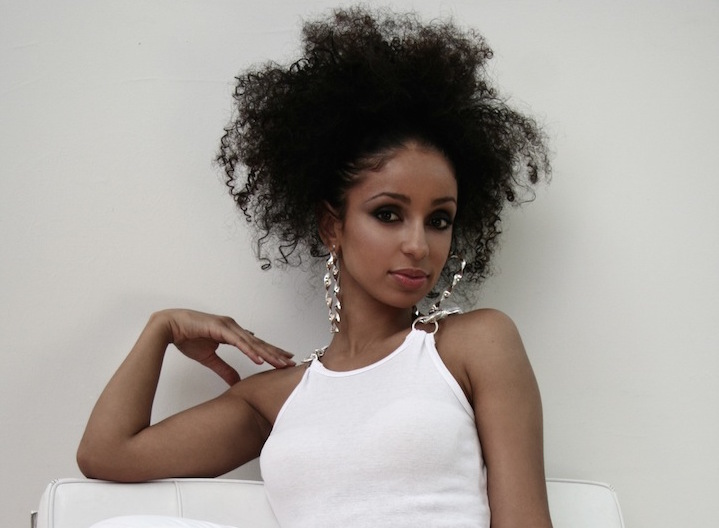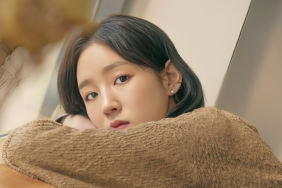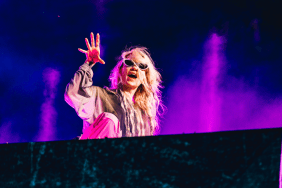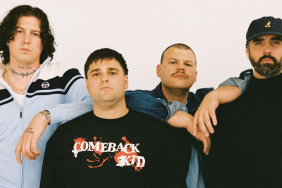For those of us who grew up during the late ’90s and early 2000s, r’n’b sensation Mýa – aka Mýa Harrison – holds a special place in our hearts. Especially for me, as I used to try and emulate her dance moves in front of Video Hits when I was 12 years old (yes, I’m a fanboy).
Best known for her hit singles It’s All About Me, Case Of The Ex and of course Lady Marmalade also featuring Missy Elliott, Christina Aguilera, Pink, and Lil’ Kim, the singer, dancer and now label head has been steadily recording and releasing music for the last eight years under her own imprint Planet 9.
Having experienced the dizzy ups and downs of the industry, Mýa has always remained focused on her music, with her latest album and her eighth independent release Smoove Jones showcasing a contemporary take on her classic ’90s r’n’b sound and some of the most refined songwriting of her career. It’s not just her music that has kept her busy all these years though, with the artist dedicating a lot of time to her philanthropic work with children at the Mýa Arts & Tech Foundation.
Set to visit our shores in the coming weeks as part of the RnB Fridays Live Tour alongside Nelly and TLC, as well as RNB Live shows alongside Blackstreet and 112, we caught up with Mýa over the phone to discuss finding a balance between the entertainment industry and life, elevating young girls and boys with her music and the lessons she learned from going independent.
Music Feeds: You’ve always done a lot of philanthropic work, is that important for you to give back like that and also to get your head out of the music industry for a bit?
Mýa: Philanthropy is something that I’ve always been involved in since 1998. But my first job was working teaching kids dance when I was fourteen. So I’ve always loved kids and it started with that. Then when I was 18 I started speaking to girls about self-esteem because I had pretty low self-esteem when I was a teenager and I think that’s something we all go through when we’re young. We all go through bullying and peer pressure and we all have self-esteem issues with trying to fit in and validate ourselves, so it started that way. And then life happens you know. My mother was diagnosed with cancer twice and she beat it thank God, but that taught me a very humble lesson about valuing life which I learned very early on and which motivated me to keep doing that kind of work. And yes, it definitely gives balance to the world of entertainment, which can be awesome, and crazy at the same time.
MF: A lot of the work you do is with young girls and about building self-esteem, and your music also has strong themes of female empowerment. Is that important to you, to put yourself forward as a strong role model for young women?
Mýa: Well yes, I am a woman, I am a female and so my perspective is going to reflect that and so my work naturally becomes empowering to women who can relate to what I am singing about. But I am also into uplifting and elevating everyone, no matter what gender or sex. I like to empower my males as well and make sure that they understand that not every woman is materialistic, that not every woman is a gold digger and that not every woman is sexual either, that we also have minds and that we respect men as well, and that they’re not just eye candy either. So it goes both ways, and it’s just about people at the end of the day, and it’s about connecting and elevating them.
MF: Because the kind of stereotypical gender roles that dominated say 50 or 60 years ago are also damaging and limited to men as well as women?
Mýa: Absolutely, I agree with you. Men are taught differently than women. We’re allowed to cry, we’re allow to wear our emotions on our sleeves and men have some real issues because they’re taught to suppress them and conceal them, which is not healthy at all, or realistic.
MF: Do you think that music helps you process your emotions?
Mýa: My goodness, music is therapy, no matter what kind you are listening to. Just music without lyrics can be so soothing for your soul, but add some lyrics on top with an incredible melody that takes you on a journey and it can be medicine, I really believe that. I felt it for the first time when I first heard my dad sing. I was four years old and I just felt something internally that made me want to sing for the rest of my life. I had no clue what a recording artist was, but music moved me in a way that I wasn’t quite able to understand or articulate, but I knew I had to do something with it. I was fascinated. It’s a blessing just to be able to do something that lights up your world and also makes other people happy. I wouldn’t have it any other way.
MF: You started out as a dancer before you were a musical artist, can you tell us a bit about that?
Mýa: I started out as a dancer professionally before I was a singer but you know they both intertwine. I was exposed to so many different styles of music through dance. From doing tap, to doing gymnastics to doing jazz, it was different every time. The dance team at school performed to rock’n’roll and country as well as Miami bass music, but when I was tap dancing I was dancing with a jazz band and I played the violin so there was also classical music. So I was exposed to so many things there, and then when I got home I had all of the incredible records that my parents would play as well as having a band in my living room every night because my dad would practice his behind off to go and perform on the weekends and make records in the studio. So I was always around music, but different kinds and I attribute dance to being my first introduction to the incredible variety of music.
MF: I feel like dance should be taught in schools to children. Just how to move and be comfortable in your body because I think a lot of people can feel very self-conscious about how they dance.
Mýa: Yes! Freedom! Kids and freedom and allowing them express themselves through movement and improvise, which we need through life. We need to be able to improvise through life half the time, not everything has to be structured. Dance definitely taught me that.
MF: Dance can sometimes be misinterpreted as being overly sexualised, and some people take issue with people who express themselves through their bodies, portraying themselves as empowered, especially female performers. Did you ever struggle with that kind of moralising?
Mýa: I believe that human beings are multi-dimensional beings. We have a mind, we have a soul and we have a physical body that we’re in. I look at every person that way. There are so many components to each individual. There is never just one thing and what you express through your art comes from a certain place. And there comes a time in every woman’s life, and every man’s life, when he or she may face an obstacle and that is where strength is pulled from, from pain. There is always a struggle with every human being on the face of this earth and we evolve from these struggles, and so you have a soul that is formulated from our experiences.
But then you also desire love, and we’re taking in so many different definitions of love and different cultures and religions around the world teach different version of what love might be, in addition to happiness and success. But you have to define it for yourself. So regarding sexuality and sensuality, there is a time when someone becomes an adult, and those are natural feelings. Depending on what society you grew up in it can be embraced, or it can be totally shut down and looked down upon. But I think it’s part of natural expression to entertain and engage with your sexuality, for every human being.
How it’s done though is where people form their opinions about you, and you’re never going to please the whole world once you speak your mind and express yourself. It’s art, and not everyone is supposed to agree with it. Some people will resonate with it, some people won’t. Many people will turn their noses up to one thing where you’ll also have many people who understand where you are in that moment of time. Some people will think it’s wrong, and some people will think it’s right, it just depends. But I say as long as you live in truth and express what your truth is at that moment in time, it’s just expression and it’s okay to be whatever you are.
MF: Do you think there is still progress to be made to free women from being shamed for being sexual in the public eye?
Mýa: Like I said, it depends on who is judging or criticising. Criticism just comes with the territory in entertainment, or just existing in this life. We have a social media world that we live in and everyone has an opinion or comment to make, whether positive or negative. Not everyone is going to agree. I believe that there always needs to be balance and perspective. Where is the sexuality coming from? Is it about empowerment? Or is it someone saying this is the only way that they can find love from people, or attention which they’re defining as love. That is not the true definition to me, but it may feel like it to someone who has never experienced what that true definition is. On the other hand, though, is it playtime? Is it me having my freedom from being locked up? We never know the backstory behind someone’s expression, or what someone is freely open to talk about or struggling with.
But I believe that images that we take on for the youth need to be monitored, because they are the audiences that are absorbing everything at alarming rates. I think they do know, but it can be very harmful to young girls and young boys at age 13 if every song is telling them that it’s okay to have unprotected sex, or sex in general, and defining that as love. I think that’s very harmful for children.
I think it’s harmful for kids to be doing drugs, and thinking it’s cool when it’s not and it’s destroying your brain cells, I don’t think that’s cool. I don’t think that children that are watching artists who are using drugs and alcohol should follow those paths because it will tamper with their future and can get them caught up in something that will affect the rest of their lives in a negative way. So young people that don’t know any better and who are looking to these icons and idols that are adults, that’s where my concern is, and that’s where I think parents’ concerns should be. Adults know better, we can make our own decisions and we can fall on our face and pick ourselves up because we’ve already established our careers and futures, but children don’t know better most of the time.
MF: Do you think children could benefit from a more open discussion about these topics?
Mýa: I think it’s very healthy to have talk shows for kids, which really don’t exist anymore. There used to be something called Teen Summit on the BET Network when I was a teenager, that I was actually on. And they discussed all of these issues for our age bracket because we were looking and taking in so much information from movies, television, video games and music that can be harmful if we follow these paths. When you’re an adult you’re able to read between the lines of these things, which is why discussions and parental advisory, as well as parental attention is so important. But when we’re young we’re rebels and we like to do what we think is cool. That’s fine when it comes to fashion or self-expression but once it gets into playing around with substances, it can really truly damage you for life and impair wise decision making. So I think education and awareness is very important for young people who are looking up to adults who have so much freedom.
MF: We should probably talk about your music for a bit. And I wanted to ask you about your latest album Smoove Jones, what it’s been like running your own label and releasing your own music?
Mýa: I’ve been independent for that last eight years, and I’m going into my ninth year now, and I’m really really happy about music. I’m still so passionate about it and I’m just really excited about music and the arts is still something that I love. Probably more so now than ever before, which is really strange. But I’m just like my dad, he’s still on the road, and he still performs and writes songs. I still write songs because it’s therapy. It’s just awesome, getting to be someone else or even being yourself, either creating fantasy land or reality and therapy. It’s all over the place and the possibilities are limitless, so music is life for me.
MF: I read that you’ve said that after eight years of being independent you’d be willing to go back and work with a major label if a good situation presented itself. But do you think you had to go independent for a while to be able to come back to the major label system?
Mýa: Well I look at everything, and I think things happen for a reason to teach us lessons. You know I had an album leak when I was with a major label, but I didn’t let it stop me. And when I jumped into the world of being independent I learned a lot about the business side of things and so I embrace it all. I know that I had to learn something on that journey, that journey has been eight years and now it’s the ninth and I’m ready to graduate and pair up or partner with a major label again because I am bringing much more to the table now. I understand the business, what it’s going through and what it has gone through and the transitions but I am super excited about where I am with artistry now, and I think I can give the best of me, which I don’t think the world has received yet.
So yeah, I think major labels are great, I think they’re all great but it’s about the whole team not just on the label side but on the management side, on the legal side, on the agent side. There are so many tiers of teams that it takes to make sure that something is successful because that is the point. But for me I’ve had a great playground over the last eight years, just to focus on art and business at my leisure, and I fell in love with that, but now I’m ready to do it for the fans because they want me back in the way that they’re used to. So the major label system is something that I’ve always been open to, but I had to do what I had to do to figure that out independently first.
–
RNB Live Sideshows
Mýa
Blackstreet
112
Wednesday, 16th November
Trak Lounge Bar, Melbourne
Tickets: Ticketmaster
Wednesday, 23rd November
Enmore Theatre, Sydney
Tickets: Enmore Theatre
Thursday, 24th November
Panthers, Sydney
Tickets: Penrith Panthers












